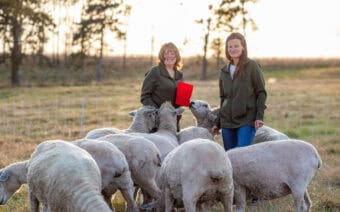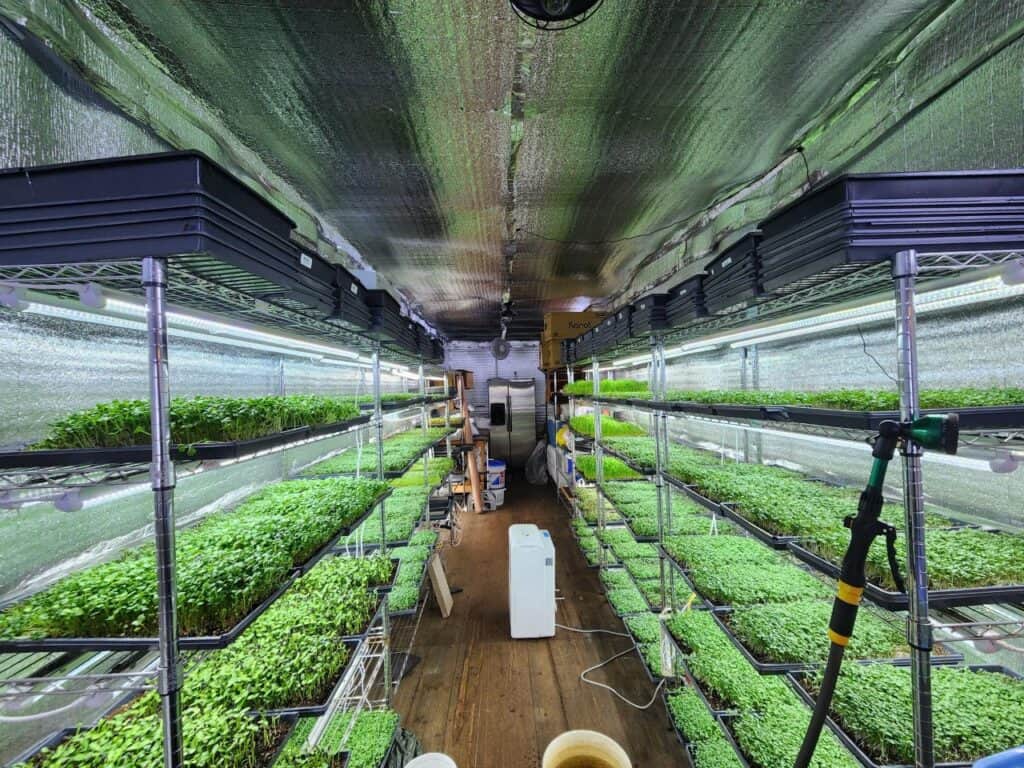
July 21, 2025
EAU CLAIRE – Owner Dan Czeltadko – a chiropractor by trade – said Farm Doc Microgreens grew from an idea to provide healthy food that was also nutrient-rich to his patients.
As he discovered microgreens and began sharing his home-grown products with others, Czeltadko said Farm Doc Microgreens was born.
“I’m a chiropractor and nutritionist by trade, but I’ve always enjoyed gardening and farm work, so this was a natural progression for me,” he said.
Czeltadko said the business has literally grown itself through word of mouth and by sharing the quality and taste of microgreens.
How it started
Promoting a whole-body approach to health and well-being to his patients, Czeltadko said in addition to providing chiropractic services, he also offers nutrition advice.
Though they appreciate the insights, Czeltadko said he would occasionally be asked, “So, just how much broccoli and kale does one have to eat to accomplish that?”
He said his wife helped him answer that question by suggesting he check out microgreens.
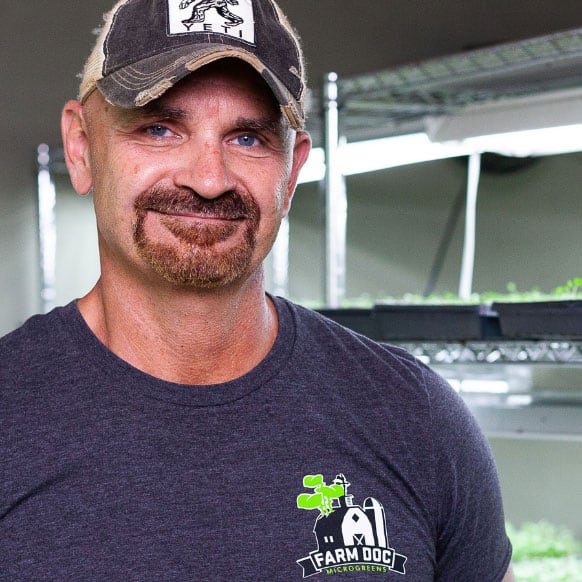
Czeltadko said his wife first encountered microgreens while visiting a farmers market in Arizona.
Instead of filling a big bowl full of leafy dark greens three times a day, Czeltadko said people can sprinkle a few tablespoons of microgreens over their food and consume more nutrients – a lot more.
“You can literally put them on anything,” he said. “The benefit of the microgreen is it has up to 40 times more nutrition per weight compared to the mature vegetable.”
Czeltadko said he started growing microgreens about seven years ago at his country home near Strum, which is located just outside Eau Claire, and eventually started sharing them with patients.
Impressed with what he was growing, Czeltadko said his patients started encouraging him to start selling his microgreens.
So, he said he packed up some samples and attended a “mini” farmers market at Coffee Grounds, a coffee shop and gourmet food store in Eau Claire.
“I sold out there, and I thought, ‘Oh, this is actually something people seem interested in,’” he said.
Czeltadko said he later set up a table at the Eau Claire Downtown Farmers Market, which sees up to 5,000 people on Saturdays in the summer.
The key, he said, is having the face-to-face opportunity to educate people about microgreens’ high nutrient density.
“People come up, and they’ll say, ‘What’s this? You’re selling grass?’” he said. “So, I give them a sample and talk to them. They’re often surprised at how much flavor the greens have for such a small little plant.”
Czeltadko said each green presents a very different flavor, which can also be surprising, given the plants’ similarity in appearance.
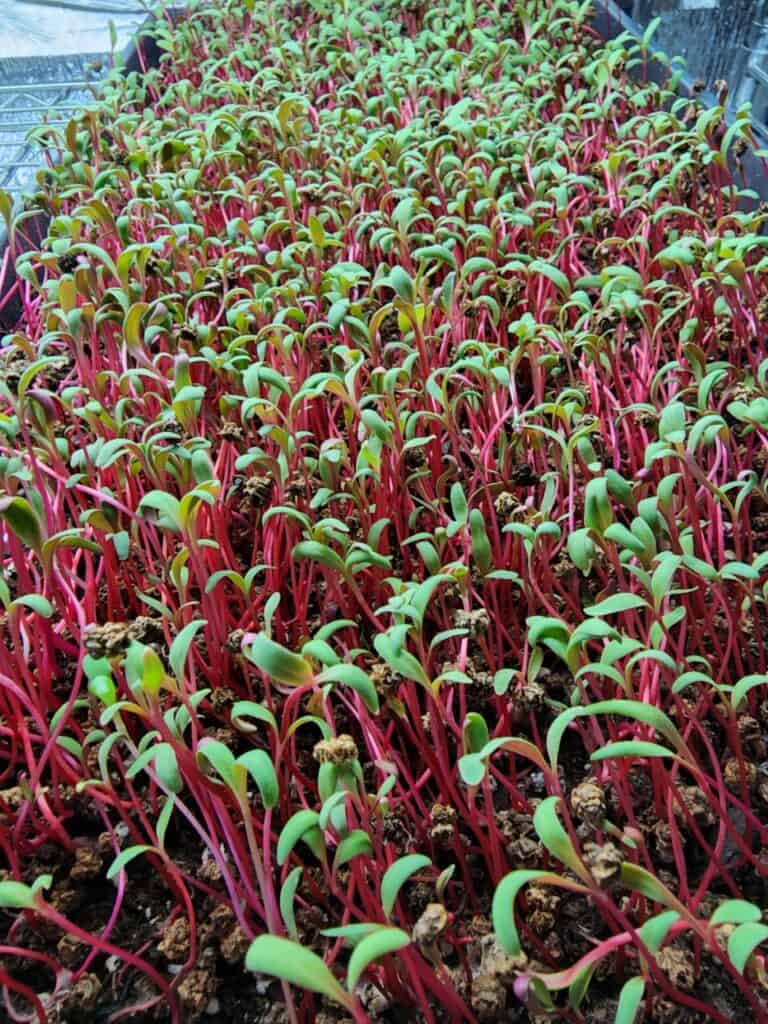
Farm Doc sells several plant varieties, he said, including broccoli, Swiss chard, leek, sugar pea, carrot and even cantaloupe and popcorn.
Czeltadko said his newer Spicy Salad Microgreen Mix is proving quite popular.
Expanding the operation
As demand grew and he sensed there was a real market for microgreens in this area, Czeltadko said he realized he needed a new, separate growing space for his plants – having outgrown a room full of plant racks in his house.
So, in 2019, to help fund the expansion, he said he entered The Idea Challenge – a grant competition for entrepreneurs sponsored by the Eau Claire Area Economic Development Corporation.
“I actually won the grand prize,” he said. “After that, the business just bloomed. I bought a shipping container in 2021. We outfitted it – adding water, electricity and everything else needed to grow the greens.”
Seeing others utilizing shipping containers for other purposes – including a greenhouse – online, Czeltadko said he thought it would work out perfectly for what he had planned, “because you already have the structure, and it’s solid.”
“The biggest thing with the microgreens is, obviously, temperature,” he said. “I target 70 degrees.”
Production can take a hit during extreme summers and winters, Czeltadko said, so the temperature inside the container needs to be carefully monitored.
A bit more about microgreens
Despite appearing somewhat like sprouts, Czeltadko said microgreens are grown in soil, not water, with the latter greatly increasing the chance for bacterial growth.
The greens are grown in peat moss, which he said he recycles by letting his chickens “tear through” the nutrient-rich fodder once the plants are harvested.
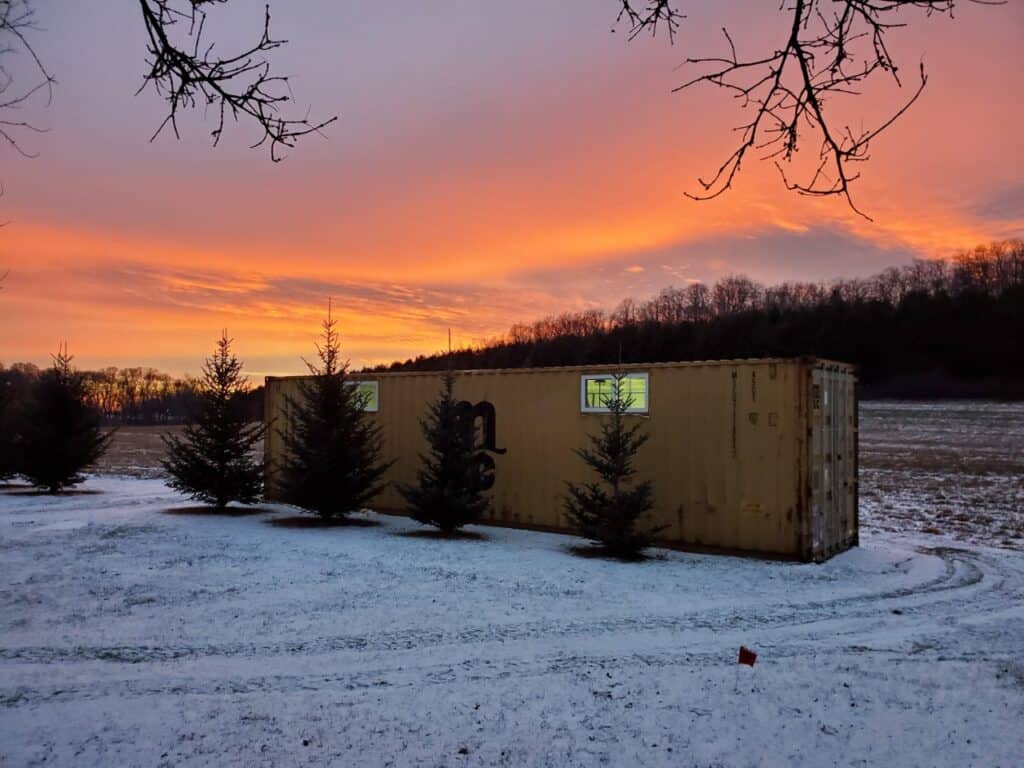
Inside the shipping container, Czeltadko said he stacks the plant trays after seeding the soil. “The plants like that pressure,” he said. “They think they’re underground. It’s a constant cycle of planting, watering, uncovering, harvesting. I plant on Tuesdays and harvest on Fridays for the Saturday markets.”
Czeltadko said the greens are sold in two-ounce containers, “and I’ll sell anywhere between 75-120 of those containers on a Saturday,” he said.
Czeltadko said he has also found buyers beyond farmers’ markets with local restaurants and grocers.
Coffee Grounds, he said, started using his microgreens on its avocado toast, and now the eatery uses a few pounds every week – which is a lot in the micro-weight world.
Czeltadko said Farm Doc products are also found in Eau Claire’s Woodman’s and Festival stores, as well as at smaller outlets.
The grocery store orders are so strong, he said, that he could shift his focus entirely to that side of the business.
“I just started going to grocery stores and saying, ‘Here’s what I have. Here’s the sample. Let me know what you think,’” he said. “And every one of them would come back and say, ‘Yeah, we want to put your stuff on the shelf.’”
Though it’s natural to assume business would slow during the colder months, Czeltadko said if anything, “I’m busier in the winter due to increased grocery store demand for farm-fresh greens.”
“The produce managers have had to buy microgreens from the West Coast, and by the time they get here, the plants would almost be mush,” he said. “My stuff will last on their shelves two weeks at least, sometimes three.”
Czeltadko said he also makes and sells Broccoli Microgreen Powder for use in smoothies or juices.
Broccoli, he said, is trending right now with awareness growing about its multiple health properties.
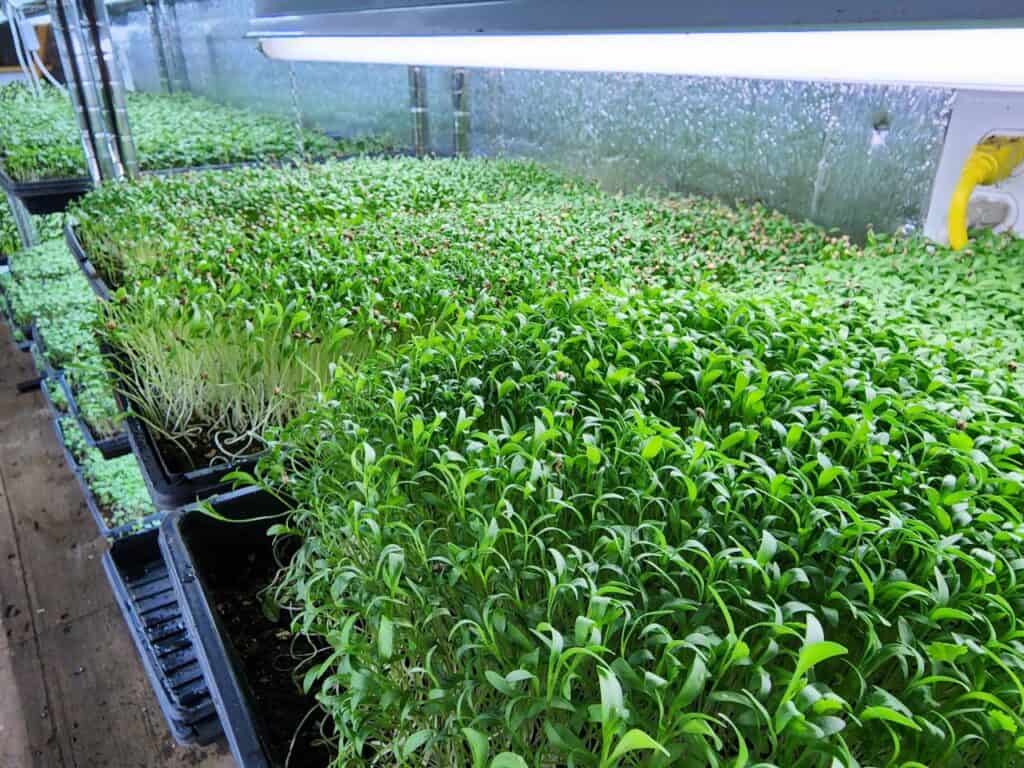
“I have parents who put it in Greek yogurt for their kids and they’ll call it ‘Shrek’ yogurt,” he said. “It doesn’t have a broccoli flavor. You can sneak it into things and people don’t even know it due to its mildness. I have recipes on my website for things like broccoli brownies with other, all-natural ingredients.”
Czeltadko said the Farm Doc’s website (farmdocmicrogreens.com) also offers meal-prep or snacking recommendations for each microgreen plant.
Beyond salads, he said microgreens also pair well with fish tacos, burgers, soups, sandwiches and pizza.
Czeltadko said the site also details each plant’s health benefits.
“Broccoli is probably one of our biggest sellers, primarily because it has sulforaphane in it, which has anti-cancer properties,” he said. “It’s a hormone detoxifier.”
Mutual growth
Czeltadko said his chiropractic practice is growing simultaneously with Farm Doc Microgreens.
After working in a group practice for 33 years, Czeltadko said he recently opened his own office – borrowing inspiration from his side hustle for the new practice’s name: Farm Doc Chiropractic and Nutrition Therapy.
Farm Doc Microgreens, he said, could easily accelerate growth but finding a transportation solution is crucial, as the brand is built on its superior freshness.
If he finds a solution, Czeltadko said it’s possible the future could see Farm Doc expanding its presence statewide.
“I started this as just kind of a side business, and now it’s really my other full-time business,” he laughs.
For now, Czeltadko said it’s a good life with both businesses serving a shared purpose: improving the health of others.
“The nice thing is, I can get up in the morning, check out the plants, then I come home, water them and… everything’s right here,” he said.
To help continue to spread microgreen education, Czeltadko said Farm Doc welcomes school groups to tour the facility.
He said he also offers other opportunities to educate the public about how microgreens help people achieve nutritional goals conveniently.
 The Bassball Cages is ready to rock in Ashwaubenon
The Bassball Cages is ready to rock in Ashwaubenon New mapping tool shows gaps in broadband coverage
New mapping tool shows gaps in broadband coverage

